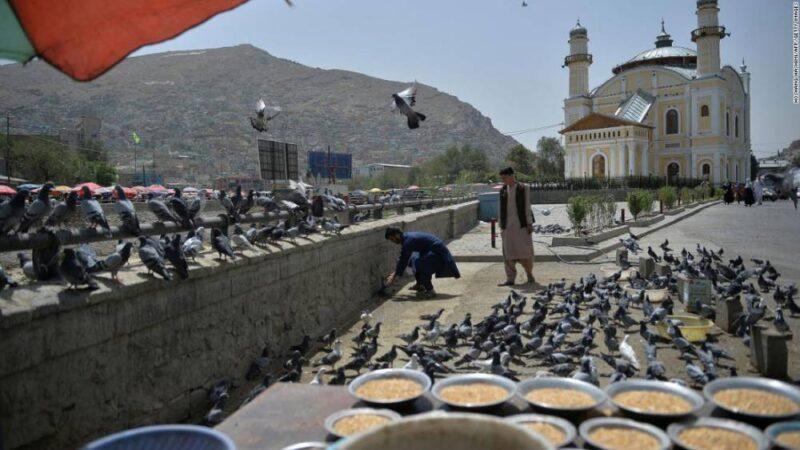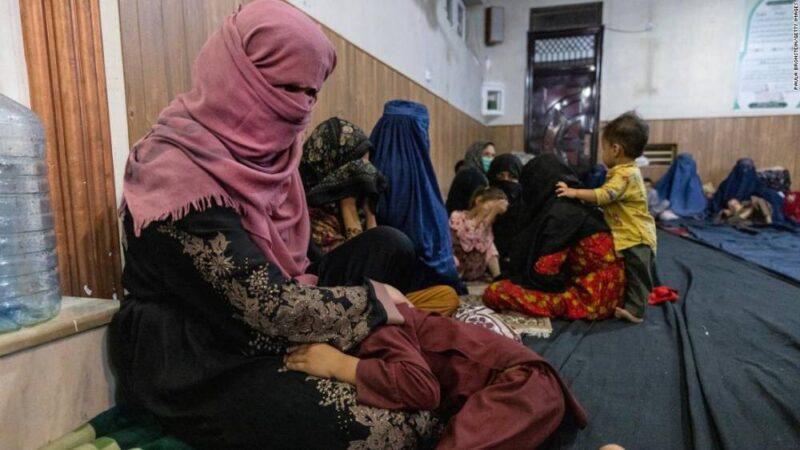New York (CNN Business)Afghanistan’s currency has tumbled to record lows this week as the Taliban seizes control of the impoverished nation and a shortage of US dollars sets off panic.
The afghani traded to 86 per US dollar on Wednesday, down sharply from about 80 a week ago, according to Refinitiv.The currency plunge reflects concern about the future of Afghanistan after the capital of Kabul fell into the hands of the Taliban, a repressive militant group sanctioned by the United States and other world powers.

GOP lawmakers urge Treasury to prevent $450 million from flowing to TalibanAfghanistan’s fragile economy relies heavily on US-led international aid — a lifeline that is now in severe doubt following the withdrawal by the United States military. About 75% of public spending is financed through international aid grants, according to the World Bank.
The decline in Afghanistan’s currency will add pressure to inflation. Rising prices, especially for food and necessities, will hit the nation’s poorest the hardest. Read MoreRobert Kahn, director of global strategy at the Eurasia Group, said a contributing factor for the currency drop is concern about a shortage of physical US dollars, on which the Afghan financial system is heavily reliant because its economy imports more than it exports.”The main challenge for the Taliban regime will be to secure access to hard currencies to pay for imported goods and prevent a full-blown balance of payments crisis,” said Piotr Matys, senior FX analyst at In Touch Capital Markets.
‘The next shipment never arrived’
In a pair of lengthy Twitter threads, Afghanistan’s central bank chief Ajmal Ahmady detailed a desperate attempt to stabilize the currency before he eventually fled the country on Sunday.”Friday – we received a call that given the deteriorating environment, we wouldn’t get any more dollar shipments,” Ahmady said. He added that the central bank had to supply less currency to the market on Saturday, “which further increased panic.”The afghani spiked from about 81 to nearly 100 on Saturday. Ahmady said meltdown prompted him to hold meetings that day to reassure markets and currency exchanges “to calm them down.”

The Taliban are sitting on $1 trillion worth of minerals the world desperately needsAhmady said Ashraf Ghani, at the time still Afghanistan’s president, spoke with US Secretary of State Antony Blinken on Saturday evening to request that dollar shipments resume — something he said the US agreed to do in principle.”The next shipment never arrived. Seems like our partners had good intelligence as to what was going to happen,” Ahmady said.
‘They urgently need to add an economist’
By Sunday, Ahmady discovered the Afghan leadership, including Ghani, had fled the country.”It did not have to end this way,” Ahmady said on Twitter. “I was disgusted by the lack of any planning by Afghan leadership.”Afghanistan’s central bank has “close to zero” hard currency left, Ahmady said. Given the shortage of dollars, the Taliban will likely have to implement capital controls, he added. “Currency will depreciate. Inflation will rise…This will hurt the poor as food prices increase.”
Like most central banks, Afghanistan’s holds most of its reserves overseas, in the form of US Treasuries, gold and other assets. Ahmady said he has been told that Taliban militants are asking central bank staffers about the location of assets.”If this is true — it is clear they urgently need to add an economist on their team,” he added.
US blocks access to funds. What will the IMF do?
In recent days, Washington has effectively blocked the Taliban from reaching assets held by the Afghan central bank in the United States, CNN has previously reported.The International Monetary Fund is scheduled to send about $450 million to Afghanistan next week. But that money could be cut off given the Taliban control of the country.

Taliban keep low key presence on streets of KabulGOP lawmakers sent a letter to Treasury Secretary Janet Yellen on Tuesday urging her to intervene and prevent the IMF from sending the funds. The Treasury Department is taking steps to prevent the Taliban from accessing the IMF funds, a Treasury official told CNN on Wednesday.Such a dispute is typically decided by a vote among IMF members, some of which have made clear they won’t recognize the Taliban as the legitimate government of Afghanistan.Marc Chandler, managing director of Bannockburn Global Forex, fears the US financial crackdown on the Taliban will backfire.”I worry that the US effort to punish the Taliban for what happened two decades ago risks bringing about what it fears,” Chandler said. “An impoverished economy will exacerbate the governance challenge and could weaken the Taliban’s hold on the country, leaving room for non-state actors — terrorists.”
What’s next for Afghanistan?
Kahn, the Eurasia Group director, said the Taliban’s economic model has shown to be “resilient” in the past.”Given the agrarian and decentralized basis of economic activity in Afghanistan,” Kahn said in an email to CNN, “their economic model has shown an ability to weather sanctions and limited access to formal financial markets/resources.”The Taliban has been sanctioned by the United States in part for human rights violations against women and girls, including banning them education, forced marriages and denying most of them access to employment.

The Taliban knocked on her door 3 times. The fourth time, they killed her
Matys, the FX analyst at In Touch Capital Markets, said optimistic investors could argue Afghanistan will become more stable in the future compared to the past two decades.”Political stability, even if it is provided by authoritarian regimes, is an important factor for foreign investors who usually do not put democracy at the top of their list of priorities,” Matys said. “If they have, the list of countries worth investing in could prove very short.”
Source: edition.cnn.com

